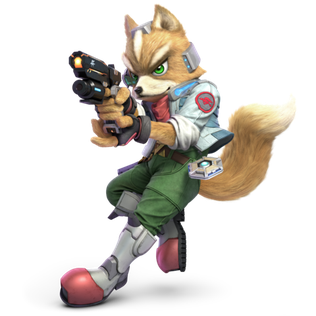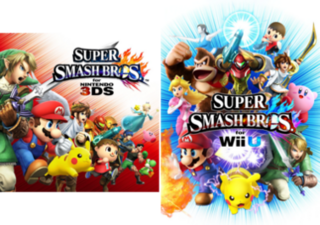Metroid is an action-adventure game franchise created by Nintendo. The player controls the bounty hunter Samus Aran, who protects the galaxy from Space Pirates and other malevolent forces and their attempts to harness the power of the parasitic Metroid creatures.

Fox McCloud is a fictional character and the chief protagonist of Nintendo's Star Fox series. He is an anthropomorphic fox created and designed by Shigeru Miyamoto and Takaya Imamura. He was introduced as the sole playable character in the original 1993 video game Star Fox. From each game, to varying extents depending on the entry, the player controls Fox in his Arwing. He is the leader of the Star Fox team and is joined by his wingmates during various missions.

Sonic Blast is a 1996 side-scrolling platform video game known for its use of pre-rendered visuals. To stop Doctor Robotnik from using Chaos Emerald shards to fortify his base, the player controls Sonic the Hedgehog and Knuckles the Echidna through 15 levels. As a Sonic the Hedgehog series platformer, the characters run and jump to reach the end of a level while defeating enemy robots and collecting rings. In separate bonus stages, the player must run forward and collect rings to earn one of the Chaos Emerald shards.

Link is a character and the protagonist of Nintendo's video game franchise The Legend of Zelda. He was created by Japanese video game designer Shigeru Miyamoto. Link was introduced as the hero of the original The Legend of Zelda video game in 1986 and has appeared in a total of 21 entries in the series, as well as a number of spin-offs. Common elements in the series include Link travelling through Hyrule whilst exploring dungeons, battling creatures, and solving puzzles until he eventually defeats the series' primary antagonist, Ganon, and saves Princess Zelda.

Mr. Game & Watch is a 2D generic stick figure-styled silhouette character, created by Nintendo as an amalgamation of various characters that appeared in the Game & Watch handheld consoles. He was created by Gunpei Yokoi, with an intention of representing the Game & Watch collection, as the consoles had no main mascot, rather characters designed for the minigames. He debuted in Ball from Game & Watch. Mr. Game & Watch has appeared as a cameo in several other Nintendo games, such as Donkey Kong Country Returns, WarioWare: Touched!, Rhythm Heaven Fever and Super Mario Odyssey.

Masahiro Sakurai is a Japanese video game director and game designer best known as the creator of the Kirby and Super Smash Bros. series. Apart from his work on those series, he also led the design of Meteos in 2005 and directed Kid Icarus: Uprising in 2012.
Pikmin is a real-time strategy and puzzle video game series created by Shigeru Miyamoto, and published by Nintendo. The games focus on directing a horde of plant-like creatures called Pikmin to collect items by destroying obstacles, avoiding hazards, and fighting fauna that are hazardous to both the player character and the Pikmin.

Pokémon is a series of video games developed by Game Freak and published by Nintendo and The Pokémon Company under the Pokémon media franchise. It was created by Satoshi Tajiri with assistance from Ken Sugimori, the first games, Pocket Monsters Red and Green, were released in 1996 in Japan for the Game Boy, later released outside of Japan as Pokémon Red Version and Blue Version. The main series of role-playing video games (RPGs), referred as the "core series" by their developers, has continued on each generation of Nintendo's handhelds. The most recently released core series games, Pokémon Scarlet and Violet, were released on November 18, 2022, for the Nintendo Switch.

Jack Bros. is an action video game developed and published by Atlus for the Virtual Boy, released in late 1995 in Japan and North America. It is a spin-off from Atlus' video game series Megami Tensei, and was the first entry to be released outside Japan.

Super Smash Bros. Melee is a 2001 crossover fighting video game developed by HAL Laboratory and published by Nintendo for the GameCube. It is the second installment in the Super Smash Bros. series. It features characters from Nintendo video game franchises such as Mario, The Legend of Zelda, Star Fox, Pokémon, and Donkey Kong among others. The stages and gameplay modes reference or take designs from these franchises as well.

Fluidity is a physics puzzle game developed by Curve Studios and published by Nintendo for WiiWare on the Wii video game console. The game focuses on controlling a small body of water that is utilized in its different states of matter to progress through the game's levels.

Super Smash Bros. for Nintendo 3DS and Super Smash Bros. for Wii U, both commonly referred to together as Super Smash Bros. 4 or Smash 4, are 2014 crossover platform fighter video games developed by Bandai Namco Studios and Sora Ltd. and published by Nintendo for the Nintendo 3DS and Wii U video game consoles. It is the fourth installment in the Super Smash Bros. series, succeeding Super Smash Bros. Brawl. The Nintendo 3DS version was released in Japan on September 13, 2014, and in North America, Europe, and Australia the following month. The Wii U version was released in North America, Europe, and Australia in November 2014 and in Japan the following month.

Dillon's Rolling Western, known in Japan as The Rolling Western, is a downloadable video game developed by Vanpool and published by Nintendo for the Nintendo 3DS. It is the first game in the Dillon series. Released exclusively through the system's Nintendo eShop online storefront, the game features Dillon, an anthropomorphic armadillo who must defend frontier villages from walking rock-like monsters. Dillon's Rolling Western combines elements of 3D exploration, action sequences and tower defense and was first unveiled at E3 2011 as The Rolling Western.

Pushmo is a downloadable puzzle game developed by Intelligent Systems and published by Nintendo for its Nintendo 3DS handheld system, available on the Nintendo eShop. In the game, players must shift around puzzle blocks in order to create steps and platforms, ultimately to reach children who have been trapped within the giant structures. A sequel, Crashmo, was released for the Nintendo 3DS in 2012. A third game, Pushmo World, was released for Wii U on June 19, 2014. A fourth game, Stretchmo, was released for Nintendo 3DS in May 2015.

HarmoKnight, known in Japan as Rhythm Hunter: HarmoKnight, is a rhythm platformer developed by Game Freak and published by Nintendo for the Nintendo 3DS. The game was released on the Nintendo eShop in Japan on September 5, 2012, and internationally on March 28, 2013.

Nintendo Badge Arcade, known in Japanese as Badge Torēru Center, was a freemium application developed by Nintendo for the Nintendo 3DS, allowing players to customize the 3DS home menu with badges. The game launched in Japan in December 2014, and worldwide in November 2015.

Cooking Mama is a video game series and media franchise owned by Cooking Mama Limited. The series is a cookery simulation-styled minigame compilation of many video games and adventures for Nintendo gaming platforms. Generally, the gameplay revolves around performing different kitchen tasks, through the instructions of "Mama", to cook various meals. The series so far consists of five main games on Nintendo DS and Nintendo 3DS, two spin-offs on Wii and DS each, as well as a spin off on 3DS. It is also a spin-off to the Gardening Mama series. The original Cooking Mama video game was also ported to iOS. A sixth main series game, Cooking Mama: Cookstar, was released for the Nintendo Switch and PlayStation 4 in 2021.















